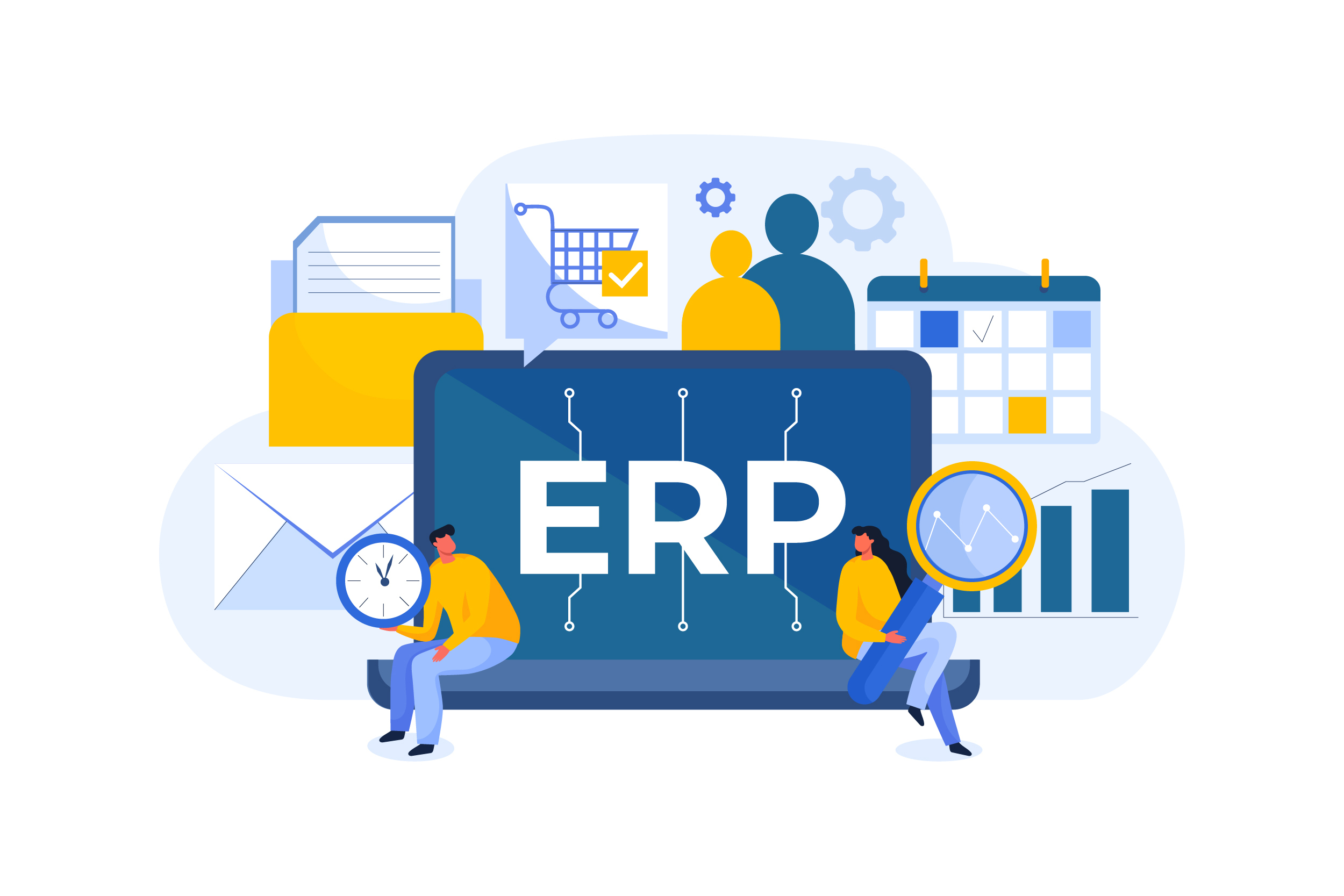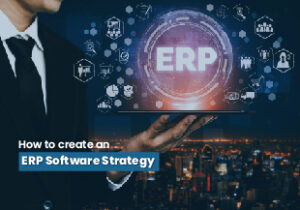Running a growing business is both exciting and challenging. As companies expand, managing sales, finances, and day-to-day operations becomes harder. This is where ERP software features can make all the difference. ERP, short for Enterprise Resource Planning, brings everything finance, sales, inventory, HR, and reporting into one system. Instead of juggling different tools, you get a single platform that helps your team work smarter and faster.
For many owners, the right ERP becomes more than software. It turns into a growth partner. By utilizing strong ERP software features, businesses can minimize errors, save time, and make more informed decisions. And that’s precisely what every growing company needs.
Why Growing Businesses Need ERP
Initially, small businesses relied on spreadsheets or basic accounting tools. However, when the situation escalates, the difficulties begin: orders are mixed up, inventory is lost, and financial reports take an eternity to be prepared. The features of ERP software overcome this by integrating all the departments and providing everyone with the same, updated information.
The top-notch ERP systems enable managers to monitor everything in real-time, thereby facilitating employee cooperation. If you opt for the right solution, you can reap the primary benefits of an ERP system, including reduced costs, elimination of work duplication, and faster decision-making. Consequently, ERP is no longer associated only with large corporations. ERP for growing firms is increasingly being viewed as a necessity for those who wish to stay competitive and grow.
The Top 5 ERP Software Features That Matter Most
Every ERP comes with many tools, but not all are equally important. Here are the top 5 ERP software features that growing businesses should look for:
1. Real-Time Data and Reporting
One of the most powerful ERP software features is real-time reporting. Instead of waiting for weekly or monthly updates, you can see your sales, cash flow, or inventory instantly. This helps you spot problems quickly and take action before they become big issues.
Modern systems include strong ERP reporting tools that let you create custom reports, track performance, and analyze trends. Having real-time data ERP gives business owners confidence in their decisions.
For businesses that want to stay ahead, these essential ERP tools are game-changers. With clear insights, you can grow with less guesswork.
2. Financial Management and Accounting
Money management is one of the key ERP software features. Good ERP platforms include a complete financial management ERP module that handles accounting, payroll, expenses, and taxes in one place.
Instead of using different systems, all-in-one ERP software makes it easier to manage cash flow and create budgets. Automated invoices, reminders, and payments reduce manual work and prevent errors.
With ERP automation, finance teams can focus on planning and strategy instead of chasing receipts. Among the top ERP functionalities, financial tools are often the most valued by businesses.
3. Inventory and Supply Chain
If your business sells or produces goods, then an inventory management ERP is a must. It tracks stock levels, supplier details, and delivery times in real-time. This prevents stockouts, over-ordering, and missed deadlines.
With robust ERP integration features, your sales and supply chain teams can collaborate seamlessly. The result? Smoother operations and happier customers.
For many companies, one of the most significant benefits of an ERP system is improved supply chain control. You save money, avoid waste, and keep shelves full without overstocking.
4. Scalability and Flexibility
Every growing company needs an ERP that grows with them. That’s why scalable ERP software features are so important. As your team expands, your ERP should be able to handle more data, users, and modules without slowing down.
ERP scalability means your system won’t hold you back. You can also utilize customizable ERP features to tailor the software to your specific needs. A retailer, for example, may need different modules than a manufacturer.
With cloud ERP solutions, scaling becomes even easier. Instead of buying servers or hardware, you simply pay for what you need. For many, this is the best way to utilize ERP for small business growth without incurring significant upfront costs.
5. Integration and Automation
The last key on our list of ERP software features is integration. Businesses often utilize tools such as CRM, HR, or e-commerce software. A good ERP connects them all, thanks to its strong ERP integration features.
With ERP automation, daily tasks such as order processing, approvals, and reminders are executed automatically. This saves time and reduces errors.
These enterprise resource planning features consolidate every department onto a single platform. The result is a smoother workflow and a business that can focus on growth rather than correcting daily errors.
Extra Tools That Add Value
Along with the top five, many businesses also use:
- ERP modules for business growth, like HR and CRM
- ERP reporting tools for compliance and audits
- ERP automation for reducing manual tasks
- Industry-specific all-in-one ERP software
Together, these tools turn ERP into a complete business management software solution.
Benefits of ERP for Growing Companies
To wrap up, here are the most significant ERP system benefits for businesses:
- Easy access to real-time data ERP
- Smoother finance with financial management ERP
- Smarter supply chains with inventory management ERP
- Flexible growth thanks to ERP scalability
- Fewer errors with ERP automation
- Industry-tailored solutions through customizable ERP features
All these ERP software features add up to stronger control, more profit, and less stress.
Why ERP Is More Important Today Than Ever Before
Starting to scale is the moment when the real challenge hits for many corporations. A small bakery can still manage its business with a notebook and a cash register. Still, when it expands to more than one location or starts selling its products online, everything suddenly becomes too complex. The same applies to manufacturers, retailers, or service providers. Growth enhances the chances but also complicates the situation. That is the moment when ERP software functionalities come into play the most.
The fantastic aspect of ERP is that it not only manages data, but it also streamlines everything. Consider it as your company’s digital nervous system. Just like the nerves of the human body link every part, ERP links all the business departments. With a robust enterprise resource planning feature, nothing is kept unconnected. The financial department is aware of the sales, operations are informed about the inventory, and the management always has a complete view.
This clarity is what transforms ERP into one of the most essential ERP tools for businesses of all sizes.
ERP in Action: Simple Stories That Show Its Value
To understand the real value of ERP software features, let’s consider a few examples.
Example 1: A Retail Store Expanding Online
A clothing retailer with two local shops decides to expand into e-commerce with a professional website. Without ERP, the retailer would have to take care of online orders separately, manually update stock, and track payments in two different mediums. Errors would be very common and would accumulate. With all-in-one ERP software, however, online sales are instantly reflected in inventory, payments are automatically recorded in accounting, and reports show both offline and online performance together.
Example 2: A Growing Manufacturer
A small furniture manufacturer struggles with delays because raw materials are often out of stock. With inventory management ERP, they can set reorder levels that automatically trigger purchase requests. Add ERP automation, and orders are sent to suppliers without human involvement. This ensures smooth production and happier customers.
Example 3: A Startup Service Agency
A digital marketing startup juggles multiple clients and projects. They often lose track of billing hours and expenses. A financial management ERP system tracks every billable hour, generates invoices, and even forecasts revenue for upcoming months. This allows them to focus on creative work instead of chasing payments.
These are just simple scenarios, but they highlight how the best ERP systems directly solve common business problems.
The Role of Customization in ERP
Not every business is the same, which is why customizable ERP features are so valuable. A hospital doesn’t need the same tools as a fashion brand. Similarly, a construction company has very different requirements than a software startup.
ERP vendors today understand this need for flexibility. They offer ERP modules for business growth that can be added, removed, or adapted as your company changes.
Customization also makes ERP more user-friendly. When employees see that the system matches their workflow, adoption becomes easier. After all, technology only works when people actually use it.
Cloud ERP: The Future of Business Management
Cloud ERP solutions are the game-changer. Unlike traditional ERP systems, which require servers, IT staff, and substantial investments, cloud ERP operates over the internet. You simply log in, and everything is available from anywhere.
Here’s why the cloud is becoming the preferred choice:
- Cost savings: You only pay for what you use.
- Scalability: As your company grows, you can easily add more features and functionalities.
- Accessibility: Teams working remotely can log in from anywhere.
- Security: Cloud providers invest heavily in data protection.
For ERP for small business growth, cloud-based setups are often the smartest option. They deliver the same ERP system benefits as big enterprises enjoy, but at a fraction of the cost.
Integration That Brings Your Business to Life
One of the most underestimated ERP software features is integration. Imagine your marketing team uses a CRM, your sales team uses spreadsheets, and your finance team uses accounting software. Every department works hard, but they’re disconnected. Integration bridges this gap.
With strong ERP integration features, all systems work together. A lead entered by marketing flows straight into sales, which then connects to invoicing in finance. Nothing gets lost, and no one has to enter data twice. This not only saves time but also prevents errors.
Integration also supports growth. If you decide to connect your ERP with an e-commerce platform, you can sync orders, update stock, and manage payments all in one place. That’s the kind of efficiency businesses need to scale.
Turning ERP Reports Into Smarter Business Moves
Having data is one thing. Making sense of it is another. This is where ERP reporting tools come in. Reports and dashboards provide insight into your business’s performance, including sales trends, expenses, and customer activity.
The best part is that these insights are not just historical; they are also relevant to the present day. Many modern systems incorporate predictive features that aid in forecasting future trends. Combined with real-time data ERP, this allows managers to prepare strategies in advance instead of reacting late.
For example, an ERP report might show that a particular product is selling fast in one region but not in another. With that knowledge, you can adjust your marketing spend or inventory levels accordingly. These small decisions, powered by ERP software features, can have a significant impact over time.
Why ERP is an Investment, Not a Cost
One hesitation many business owners have is the cost of ERP. Implementing ERP indeed requires money and effort, but it should always be seen as an investment. When you calculate the savings from fewer errors, reduced delays, and faster processes, the value becomes clear.
Think of it like hiring an extremely skilled manager who never makes mistakes and works 24/7. That’s what ERP automation and other top ERP functionalities bring to the table. In most cases, businesses see a return on their ERP investment much faster than expected.
The Future of ERP for Growing Businesses
Looking ahead, ERP is only going to become more intelligent. Artificial intelligence, machine learning, and advanced analytics are being integrated into modern systems. Soon, ERP won’t just show you what’s happening; it will suggest what you should do next.
For businesses that want to stay competitive, adapting early is key. By embracing the right ERP software features today, you prepare your company for tomorrow’s challenges.
How Prismatic Technologies Helps Businesses Grow With ERP
At Prismatic Technologies, we don’t just provide software; we help businesses unlock growth. We design ERP setups that incorporate the best ERP software features tailored to your specific needs. Whether you want cloud ERP solutions, ERP for growing businesses, or seamless ERP integration features, our team has the expertise to guide you.
We focus on building systems that save you time, cut costs, and boost productivity. With Prismatic Digital Solution, your ERP won’t just be software; it’ll be your growth partner.
FAQs
- What are the top ERP software features for small businesses?
The most important ones include financial management, inventory control, reporting, and integration tools.
- How does ERP help growing companies?
It brings all business processes together, offering ERP system benefits such as efficiency, lower costs, and improved decision-making.
- Can ERP be customized?
Yes. Many providers offer customizable ERP features and industry-specific modules.
- Is cloud ERP better than traditional ERP?
For many small and mid-sized companies, cloud ERP solutions are more cost-effective and easier to scale.
- How long does ERP setup take?
It depends on business size and requirements, but with proper planning and the right team, even complex ERP integration features can be implemented smoothly.


